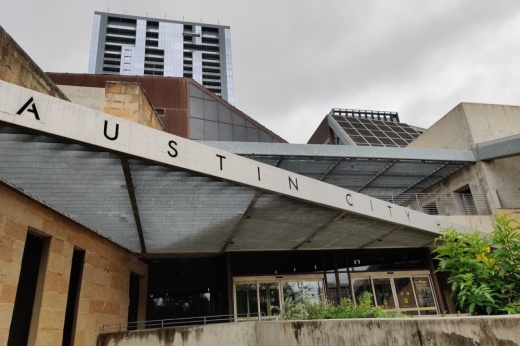New city manager arrives
After former City Manager Spencer Cronk's firing in February 2023 and months of temporary leadership under interim City Manager Jesús Garza, City Council picked a new permanent city manager to oversee Austin's government in early 2024.
Mayor Kirk Watson labeled the decision as among the most important he and other council members would make, and after a national search, they chose former Dallas City Manager T.C. Broadnax. He was appointed in early April and officially started on the job in May.
Police contract set
After a year of stalled talks between the city and Austin Police Association, representing the Austin Police Department force, both sides began meeting again in early 2024 in hopes of securing a new long-term labor agreement.
Contract negotiations stretched on for months and culminated in council's approval of a record deal that's expected to cost about $220 million through the next five years. Debate over the contract drew strong support and opposition from Austinites leading up to council's vote, which also centered on the city's handling of voter-approved police oversight policies.
Police leadership changes
In addition to that labor update, APD also got new leadership in 2024.
Former Cincinnati police executive Lisa Davis was confirmed as Austin's police chief in the summer, taking over a department that's been facing challenges with staffing, emergency response times, community confidence and officer morale. Davis said she hopes to address those points and more as she continues on the job, and released a 100-day plan aimed at several of those points this fall.
Outside the department, Austin police also have new oversight from another former Dallas official. Eddie Garcia, previously chief of that city's police force, was named Austin's assistant city manager over public safety and started in that role this fall.
Land-use revisions continue
The current council, many of whom were elected after campaigns that focused on changing city development rules, kept land-use in focus through 2024.
Officials followed up on their controversial vote on the first phase of the Home Ownership for Middle-income Empowerment, or HOME, initiative in late 2023 by approving the program's second phase in the spring. Together, the changes are meant to allow more types of housing in Austin's single-family areas, although required city reporting on the policies' effects has been delayed.
Alongside the HOME Phase 2 vote, council also slashed longstanding rules meant to limit the size of new apartments near residential areas and set new standards for mixed-use development with affordable housing along transit routes.
Earlier this year, council also enacted a new building policy that's bringing dozens of taller, denser projects to neighborhoods around Austin.
Those changes are among the many land development code updates pursued by the current council, with more to come in 2025 and beyond.
HOME and other recent updates have drawn attention outside of Central Texas, with local officials joining Boston City Council to promote the changes this year as well.
Taxes, fees continue to rise
A record budget was approved for fiscal year 2024-25, with property taxes and various city fees and charges expected to be several hundreds dollars higher than in FY 2023-24.
Council passed the nearly $6 billion budget with funding for several homelessness initiatives that emerged as priorities during debates over the spending plan.
This year's budget talks, and the later approval of the police contract, also brought the prospect of tighter financial conditions in the near future into focus. City staff have said Austinites will likely have to consider voting for higher tax rates in the late 2020s to maintain city services, and to fund further planned spending for work like the I-35 cap and stitch initiative.
Transit plans remain unsettled
Years after voters approved an indefinite tax hike to fund a new light rail and rapid bus network—Project Connect—plans to realize the transit system remain in motion, while legal action to halt the program also continues.
In 2024, Project Connect officials moved to validate the system's unique funding scheme in court. A group of locals has also sued over the taxing and scaled-back transit plan, and opposition now includes Attorney General Ken Paxton who's aiming to stop the program.
Project development, and several related lawsuits, remain in progress heading into 2025.
Voters back new, returning council members
This fall's elections set up a new version of City Council to take the reigns next year.
Several officials up for reelection held their seats, including District 2 representative Vanessa Fuentes and District 4's Chito Vela. Incumbent Mayor Kirk Watson also claimed a narrow victory this November, the fourth time Austinites have voted him into City Hall.
Other new faces joining the dais include Krista Laine, who defeated District 6 incumbent Mackenzie Kelly; Marc Duchen, who won the open race in District 10; and Mike Siegel, who secured a runoff election win in District 7 in December. They'll be sworn in Jan. 6.
Utility plans approved
New strategies for the future use and conservation of power and water in Austin also earned thumbs-ups from city officials this fall.
Multiple long-range plans from Austin Water were approved in November, followed by council's December vote for Austin Energy's decade-long resource and climate plan intended to guide the utility to net-zero carbon generation by 2035.





